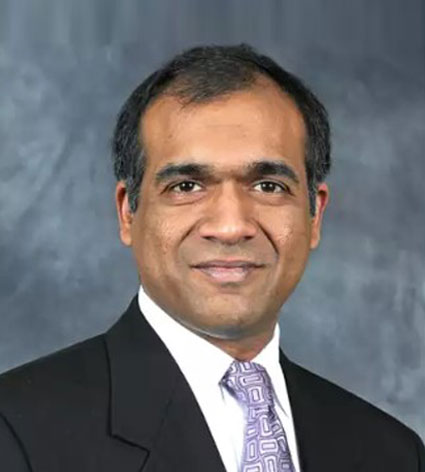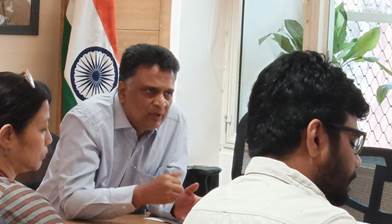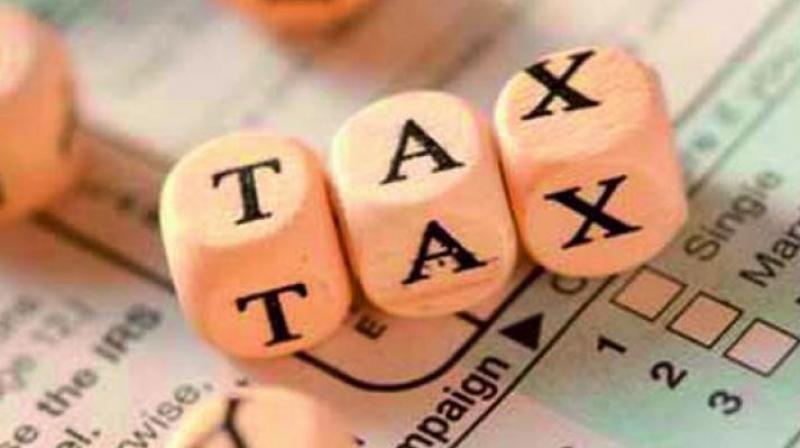Revolutionizing Indian B-Schools: Integrating Artificial Intelligence for Enhanced Learning Outcomes
Author: Dr Prabhu Aggarwal

At the recently held Davos World Economic Forum, Artificial Intelligence (AI) was the lead star and one which got the maximum attention. Other than its potential to transform lives and work, its disruptive features including job losses and potential degeneration of human intellect were also discussed. However, allaying apprehension about any risk to human intelligence by AI, Sam Altman, CEO of OpenAI, said human ingenuity will prevail. Citing Deep Blue beating world chess champion Garry Kasparov in 1997 and the fear of extinction of the game thereafter, Altman highlighted how the game continues to be more popular than ever before.
The challenge, and task before us, therefore is not to get overwhelmed by the new tech but devise strategies on how to best leverage AI. In the ever-evolving landscape of business education, the integration of AI stands out as a transformative force capable of revolutionizing education at Indian B-Schools. As we navigate through the fourth industrial revolution, characterized by rapid technological advancements and a big demographic dividend, the traditional models of education are being redefined. The adoption of AI promises to bring about substantial improvements in learning outcomes, preparing business students for the dynamic challenges of the corporate world.
In fact the New Education Policy 2020 of the Government of India had rightly prioritized integration of AI in education, and the NITI Aayog too considers AI literacy as one of national priority. Prime Minister Narendra Modi also recently said that in India we are witnessing an AI innovation spirit. The need for the B-Schools to embrace this spirit couldn’t have come at a better time.
Several leading international B-Schools have embraced AI in their educational practices, setting examples for institutions worldwide. Harvard Business School, for instance, uses AI-driven platforms for personalized learning experiences and simulations. INSEAD in France utilizes AI for curriculum design and analytics to enhance student engagement. Indian B-Schools can draw inspiration from these global best practices and tailor them to suit the local context.
Indian B-Schools have long been recognized for producing some of the brightest minds in the business world. However, with the changing dynamics of global business environments, there is an increasing need for these institutions to adapt and incorporate innovative approaches to education. The traditional lecture-based teaching model, though effective in its own right, may fall short in delivering the skills and insights required in the contemporary corporate landscape.
B-Schools in India face various challenges, including outdated curriculum models, limited access to real-world business scenarios, and the need for personalized learning experiences. The business world is becoming increasingly data-driven and complex, requiring graduates to possess not only theoretical knowledge but also practical skills and adaptability. It is imperative for management institutions to address these challenges and prepare students for the demands of the modern workplace.
The Role of Artificial Intelligence in Education
AI has emerged as a game-changer in the education sector globally. Its applications range from personalized learning experiences to predictive analytics, enabling institutions to tailor educational programs to individual needs. By leveraging AI, management schools can bridge the gap between theoretical knowledge and practical application, fostering a more dynamic and engaging learning environment.
One of the key advantages of integrating AI into B-Schools is the ability to offer personalized learning experiences. AI algorithms can analyze individual learning styles, preferences, and pace, tailoring educational content to suit the needs of each student. This not only enhances understanding but also promotes self-directed learning, a crucial skill in the professional world.
AI can create immersive and realistic simulations of business scenarios, providing students with a hands-on experience of decision-making in complex situations. These simulations replicate the challenges faced by executives, allowing students to apply theoretical concepts to practical problems. Such experiences can significantly enhance problem-solving skills and decision-making abilities.
AI-driven predictive analytics can be employed to identify students at risk of falling behind or facing challenges in specific subjects. By analyzing patterns in student behavior, performance, and engagement, institutions can intervene proactively, providing additional support or resources to ensure student success. This targeted approach contributes to higher retention rates and overall student satisfaction.
AI-powered tools can facilitate seamless collaboration and communication among students, faculty, and industry experts. Virtual collaboration platforms, chatbots, and communication tools powered by natural language processing can create a more connected and interactive learning community. This not only fosters a sense of belonging but also prepares students for the collaborative nature of the modern workplace.
A 2022 Unesco Report also highlighted the benefits for teachers: “AI provides several opportunities for the empowerment of teachers in India, ranging from novel ways for them to continue their own education to making their routine tasks more efficient, thus increasing their availability for their students.”
The dynamic nature of the business world requires B-Schools to adapt their curricula continuously. AI can play a crucial role in identifying emerging trends, industry needs, and skill gaps, enabling institutions to update their programs in real-time. By analyzing data on job market demands and industry developments, B-Schools can ensure that their graduates are equipped with the most relevant and in-demand skills.
While the integration of AI in education has numerous benefits, it also raises ethical considerations that must be addressed. Ensuring transparency in AI algorithms, safeguarding student data privacy, and promoting ethical AI practices are essential steps in creating a responsible and trustworthy learning environment. B-Schools must prioritize ethical considerations in their AI implementations to build trust among students, faculty, and stakeholders.
The integration of AI into B-Schools is not without its challenges. Institutions may face resistance to change, concerns about job displacement for traditional teaching roles, and the need for significant investment in technology infrastructure. However, the long-term benefits, including improved learning outcomes and graduates better prepared for the workforce, outweigh these challenges. Strategic planning, faculty training, and stakeholder engagement are critical elements in successfully overcoming these hurdles.
The integration of artificial intelligence into Indian B-Schools is not just a technological advancement but a strategic imperative for staying relevant in the 21st-century education landscape. By harnessing the power of AI, B-Schools can deliver personalized learning experiences, bridge the gap between theory and practice, and prepare graduates for the complexities of the modern business world. As we embark on this transformative journey, it is essential for institutions, educators, and policymakers to collaborate, address ethical considerations, and pave the way for a future where AI-driven education becomes the cornerstone of business excellence.
(Author, Dr Prabhu Aggarwal, is curently serving as Director, Badruka School of Management, Hyderabad, Telangana)
More In Public Affairs
NEP-2020 aspires for inclusive excellence in school education
Rajeev Ranjan Roy
The New Education Policy-2020 (NEP-2020), unveiled recently, aims at achieving excellence in school learning by imparting quality, affordable and inclusive education to all, with an extra emphasis on those children coming from socially and educationally disadvantaged groups of the society. It is a futuristic endeavour towards building Ek Bharat, Shrestha Bharat. The previous education policies largely focussed on the issues of access and equity in giving school education, while the NEP-2020 commits to laying the foundation of a vibrant Bharat where no one is devoid of a kind of school education, which helps every student become an asset for the nation in a true sense. The unfinished agenda of the National Policy on Education 1986, which was modified in 1992, has been effectively dealt with in the NEP-2020 along with the vision behind the Right to the Free and Compulsory Education Act, 2009, which “laid down legal underpinnings for achieving universal elementary education.”
Given the undisputed role of education in nation building, the NEP-2020 rightly lays the stress on standardization and accreditation of school infrastructure and teachers as well, since education with accountability, transparency and affordability is the need of the hour, and hence the need to “empower schools, teachers with trust, enabling them to strive for excellence and perform at their very best, while ensuring the integrity of the system through the enforcement of complete transparency and full public disclosure of all finances, procedures and outcomes.” Since private sector is significantly present in the field of school education, the idea to promote ‘not-for-profit’ entities is a unique feature of NEP-2020, which at the same time intends to promote private philanthropic efforts for quality education, thereby affirming the public-good nature of education, while protecting parents and communities from arbitrary increase in tuition fees.
An equally important area, which has got due attention in the NEP-2020 is the need for efficient resourcing and effective governance through school complexes and clusters, a significant initiative in view of the fact that nearly 28 per cent of India’s public primary schools and 14.8 per cent of upper primary schools have less than 30 students. The average number of students per grade in the elementary schooling system – Grades 1 to 8 – is about 14, with a notable proportion having below six students during 2016-17, the year which also had 1,08,017 single-teacher schools, and majority of them – 85,743 – being primary schools taking care of Grades 1-5 children. It was, therefore, a pressing need to evolve a mechanism for establishing a grouping structure, say, school complexes, consisting of one secondary school together with all other schools, which lead to greater resource efficiency and more effective functioning, coordination, leadership, governance, and management of schools in the cluster. This will not only ensure optimum utilisation of resources, but will also foster the sense of oneness and togetherness among the school children, who are the future of the nation.
What further makes the New Education Policy-2020 uniquely special is its pledge for equitable and inclusive education for all, one of the great dreams of our founding fathers. Education, as the NEP-2020 rightly envisions, is “the single greatest tool for achieving social justice and quality.” Inclusive and equitable education, indeed an essential goal in its own right, is also critical to achieving a social order where every citizen has “the opportunity to dream, thrive, and contribute to the nation.” Quality, affordable and ethical education to all is the first move to break multiple social and economic barriers, which sow the seeds of exclusion, discrimination and exploitation against our own people on different parochial considerations.
Needless to say efforts were made in the past as well to bridge the educational chasm between socially and educationally disadvantaged groups (SEDGs) and the children of top social strata, but the desired results remained elusive. SEDGs account for the country’s overwhelming population, but their children’s share in quality school educational institutions has been minimal over the years. Early childhood care and education (ECCE) needs to be handled more comprehensively. According to the Unified-District Information System for Education (U-DISE) 2016-17 data, about 19.6 per cent of students belonged to Scheduled Castes (SCs) at the primary level, but this fraction fell to 17.3 per cent at the higher secondary level. These enrollment drop-outs were more severe for ST students (10.6 per cent to 6.8 per cent), and differently-abled children (1.1 per cent to 0.25 per cent), with even greater declines for female students within each of these categories. Thus, there is no scope for any complacency on the part of the government. A series of interventions including better facilities, more and more hostels, scholarships and other enabling support have been provisioned in the NEP-2020 so that the idea of ‘learning for all’ is realised in a more comprehensive manner.
Teachers are not only an integral part of an education system, but the most important stakeholder in the entire gamut of things. Their quality and ability to teach school students, when they are in their formative age, become something of paramount importance. From their recruitment to training, every precaution needs to be taken to ensure that school education is not rendered to a mere formality, but becomes a game changer. The New Education Policy-2020 comes with a basket full of tools and parameters to ensure holistic training and upgradation of teachers and their teaching skills in a sustainable manner. From continuous professional development (CPD) to career management and progression (CMP), the NEP-2020 vouches for a set of common guidelines – National Professional Standards for Teachers (NPST), which will be put in place by the National Council for Teacher Education (NCTE) in its restructured new form as the Professional Standard Setting Body (PSSB) under the General Education Council. This exercise will be carried out in consultation with National Council Educational Research and Training (NCERT), SCERTs, teachers from across levels and regions.
The teacher education will also undergo a sea-change. By 2030, the minimum degree qualification for teaching will be a 4-year integrated B.Ed. that teaches a range of knowledge content. Today B.Ed. teaching is most poorly regulated in our country ever since the standalone B.Ed. colleges were allowed to be opened up in the private sector. It is high time to take B.Ed. teaching more than seriously. The NEP-2020 stipulates that by 2021, a new and comprehensive National Curriculum Framework for Teacher Education (NCFTE-2021) will be formulated by the NCTE. NCFTE, which will also factor in the requirements of teacher education curricula for vocational education, will be revised once every 5-10 years.
In conclusion, the NEP-2020 visualizes to impart a school education which lays the foundation of a self-reliant India and also to help our country emerge as a knowledge hub. From the foundation of learning to foundational literacy and numeracy to checking drop outs and ensuring universal access to education for all and at all levels to the restructuring of school curriculum, India is in for a metamorphosis in the field of school education, recognizing, identifying and fostering the unique capabilities of each student. Tools such as multi disciplinarity, emphasis on conceptual understanding, creativity and critical thinking, ethics and human and constitutional values, full equity and inclusion, and light but tight regulatory framework are bound to do wonders. Education is a public service, a rare pursuit in nation building, which should be holistic and inclusive and must make one take pride in India and its rich, diverse, ancient and modern culture and knowledge systems and tradition. The NEP-2020 aspires so, indeed!
( The writer is a senior journalist and author. The views expressed are strictly personal.)
NEP-2020 aspires for inclusive excellence in school education
Rajeev Ranjan Roy
The New Education Policy-2020 (NEP-2020), unveiled recently, aims at achieving excellence in school learning by imparting quality, affordable and inclusive education to all, with an extra emphasis on those children coming from socially and educationally disadvantaged groups of the society. It is a futuristic endeavour towards building Ek Bharat, Shrestha Bharat. The previous education policies largely focussed on the issues of access and equity in giving school education, while the NEP-2020 commits to laying the foundation of a vibrant Bharat where no one is devoid of a kind of school education, which helps every student become an asset for the nation in a true sense. The unfinished agenda of the National Policy on Education 1986, which was modified in 1992, has been effectively dealt with in the NEP-2020 along with the vision behind the Right to the Free and Compulsory Education Act, 2009, which “laid down legal underpinnings for achieving universal elementary education.”
Given the undisputed role of education in nation building, the NEP-2020 rightly lays the stress on standardization and accreditation of school infrastructure and teachers as well, since education with accountability, transparency and affordability is the need of the hour, and hence the need to “empower schools, teachers with trust, enabling them to strive for excellence and perform at their very best, while ensuring the integrity of the system through the enforcement of complete transparency and full public disclosure of all finances, procedures and outcomes.” Since private sector is significantly present in the field of school education, the idea to promote ‘not-for-profit’ entities is a unique feature of NEP-2020, which at the same time intends to promote private philanthropic efforts for quality education, thereby affirming the public-good nature of education, while protecting parents and communities from arbitrary increase in tuition fees.
An equally important area, which has got due attention in the NEP-2020 is the need for efficient resourcing and effective governance through school complexes and clusters, a significant initiative in view of the fact that nearly 28 per cent of India’s public primary schools and 14.8 per cent of upper primary schools have less than 30 students. The average number of students per grade in the elementary schooling system – Grades 1 to 8 – is about 14, with a notable proportion having below six students during 2016-17, the year which also had 1,08,017 single-teacher schools, and majority of them – 85,743 – being primary schools taking care of Grades 1-5 children. It was, therefore, a pressing need to evolve a mechanism for establishing a grouping structure, say, school complexes, consisting of one secondary school together with all other schools, which lead to greater resource efficiency and more effective functioning, coordination, leadership, governance, and management of schools in the cluster. This will not only ensure optimum utilisation of resources, but will also foster the sense of oneness and togetherness among the school children, who are the future of the nation.
What further makes the New Education Policy-2020 uniquely special is its pledge for equitable and inclusive education for all, one of the great dreams of our founding fathers. Education, as the NEP-2020 rightly envisions, is “the single greatest tool for achieving social justice and quality.” Inclusive and equitable education, indeed an essential goal in its own right, is also critical to achieving a social order where every citizen has “the opportunity to dream, thrive, and contribute to the nation.” Quality, affordable and ethical education to all is the first move to break multiple social and economic barriers, which sow the seeds of exclusion, discrimination and exploitation against our own people on different parochial considerations.
Needless to say efforts were made in the past as well to bridge the educational chasm between socially and educationally disadvantaged groups (SEDGs) and the children of top social strata, but the desired results remained elusive. SEDGs account for the country’s overwhelming population, but their children’s share in quality school educational institutions has been minimal over the years. Early childhood care and education (ECCE) needs to be handled more comprehensively. According to the Unified-District Information System for Education (U-DISE) 2016-17 data, about 19.6 per cent of students belonged to Scheduled Castes (SCs) at the primary level, but this fraction fell to 17.3 per cent at the higher secondary level. These enrollment drop-outs were more severe for ST students (10.6 per cent to 6.8 per cent), and differently-abled children (1.1 per cent to 0.25 per cent), with even greater declines for female students within each of these categories. Thus, there is no scope for any complacency on the part of the government. A series of interventions including better facilities, more and more hostels, scholarships and other enabling support have been provisioned in the NEP-2020 so that the idea of ‘learning for all’ is realised in a more comprehensive manner.
Teachers are not only an integral part of an education system, but the most important stakeholder in the entire gamut of things. Their quality and ability to teach school students, when they are in their formative age, become something of paramount importance. From their recruitment to training, every precaution needs to be taken to ensure that school education is not rendered to a mere formality, but becomes a game changer. The New Education Policy-2020 comes with a basket full of tools and parameters to ensure holistic training and upgradation of teachers and their teaching skills in a sustainable manner. From continuous professional development (CPD) to career management and progression (CMP), the NEP-2020 vouches for a set of common guidelines – National Professional Standards for Teachers (NPST), which will be put in place by the National Council for Teacher Education (NCTE) in its restructured new form as the Professional Standard Setting Body (PSSB) under the General Education Council. This exercise will be carried out in consultation with National Council Educational Research and Training (NCERT), SCERTs, teachers from across levels and regions.
The teacher education will also undergo a sea-change. By 2030, the minimum degree qualification for teaching will be a 4-year integrated B.Ed. that teaches a range of knowledge content. Today B.Ed. teaching is most poorly regulated in our country ever since the standalone B.Ed. colleges were allowed to be opened up in the private sector. It is high time to take B.Ed. teaching more than seriously. The NEP-2020 stipulates that by 2021, a new and comprehensive National Curriculum Framework for Teacher Education (NCFTE-2021) will be formulated by the NCTE. NCFTE, which will also factor in the requirements of teacher education curricula for vocational education, will be revised once every 5-10 years.
In conclusion, the NEP-2020 visualizes to impart a school education which lays the foundation of a self-reliant India and also to help our country emerge as a knowledge hub. From the foundation of learning to foundational literacy and numeracy to checking drop outs and ensuring universal access to education for all and at all levels to the restructuring of school curriculum, India is in for a metamorphosis in the field of school education, recognizing, identifying and fostering the unique capabilities of each student. Tools such as multi disciplinarity, emphasis on conceptual understanding, creativity and critical thinking, ethics and human and constitutional values, full equity and inclusion, and light but tight regulatory framework are bound to do wonders. Education is a public service, a rare pursuit in nation building, which should be holistic and inclusive and must make one take pride in India and its rich, diverse, ancient and modern culture and knowledge systems and tradition. The NEP-2020 aspires so, indeed!
( The writer is a senior journalist and author. The views expressed are strictly personal.)



